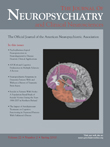Complete Atrioventricular Block in a Young Schizophrenia Patient
To the Editor: It is widely known that psychiatric patients have higher rates of death from several causes, including cardiovascular disease, especially among those with schizophrenia. 1 A wide number of factors may contribute to this increased risk, including the use of psychotropic agents with cardiovascular adverse effects. Soon after their discovery, antipsychotics were related to sudden death. Traditionally, the main effect of antipsychotics takes place on the heart conduction system and the QT interval. 2 Complete atrioventricular block is not routinely associated with the use of antipsychotics, and, to our concern, there has been only one report of the development of atrioventricular block concurrent with the use of antipsychotics. 3
We hereby present a case report of a 20-year-old man with schizophrenia who developed complete atrioventricular block during the use of antipsychotics while he was under inpatient treatment at Galba Velloso Hospital in Belo Horizonte, Minas Gerais, Brazil. He had been under irregular psychiatric treatment since he was 16, using lithium carbonate, carbamazepine, and risperidone, and despite the treatment there had been no improvement in his state. In a psychiatric forensic exam he was diagnosed as having disorganized schizophrenia or hebephrenia. There was no medical history of clinical comorbidities other than a report of alcohol abuse since the age of
Initially he was prescribed haloperidol (10 mg/day) and lorazepam (2 mg/night); carbamazepine (800 mg/day) was gradually added to his regimen in an attempt to control the impulsivity and disorganized behavior. Since there was no improvement after 18 days of this treatment, we substituted haloperidol with pimozide, 4 mg t.i.d., before trying an atypical antipsychotic. Two days after this change, the patient presented syncope with heart rate of 20 bpm and blood pressure of 140 × 90 mm Hg. A bedside ECG revealed signs of complete atrioventricular block, high amplitude QRS complexes, and a QTc of 560 ms ( Figure 1 ). He was transferred to the Hospital of Clinics of the Federal University of Minas Gerais, where a temporary transvenous pacemaker was used in an attempt to correct the arrhythmia. Although drugs were washed out, there was persistent conduction disturbance, which led to the implantation of a permanent pacemaker. Biochemical exams revealed no abnormalities in the electrolytes, liver, or kidney functions, and a chest radiography showed an increased cardio-thoracic index. Thyroid function and trypanosome serology studies had normal values. A cardiologic examination confirmed the diagnosis of asymptomatic heart failure probably due to alcoholic cardiomyopathy. An echocardiogram showed dilated cardiomyopathy with an ejection fraction of 39%. The patient is currently being treated with olanzapine (20 mg/day) and lithium carbonate (1,200 mg/day), resulting in good control of psychotic symptoms and disorganized behavior; he has had no other cardiovascular events since.

This is, up to the moment, the first case report of the development of an atrioventricular block attributable to the use of pimozide, considering that the patient had presented no cardiovascular event when he previously used carbamazepine. This report indicates the importance of clinical monitoring of psychiatric patients, in an attempt to prevent sudden events that could have lethal consequences.
1. O′Brien P, Oyebode F: Psychotropic medication and the heart. Adv Psychiatr Treatment 2003; 9:414–423Google Scholar
2. Reilly JG, Thomas SHL, Ferier IN: Recent studies on ECG changes, antipsychotic use and sudden death in psychiatric patients. Psychiatr Bull 2002; 26:110–112Google Scholar
3. Rao AV: Fluphenazine decanoate causing atrioventricular block. Indian Heart J 1996; 48:713–714Google Scholar



